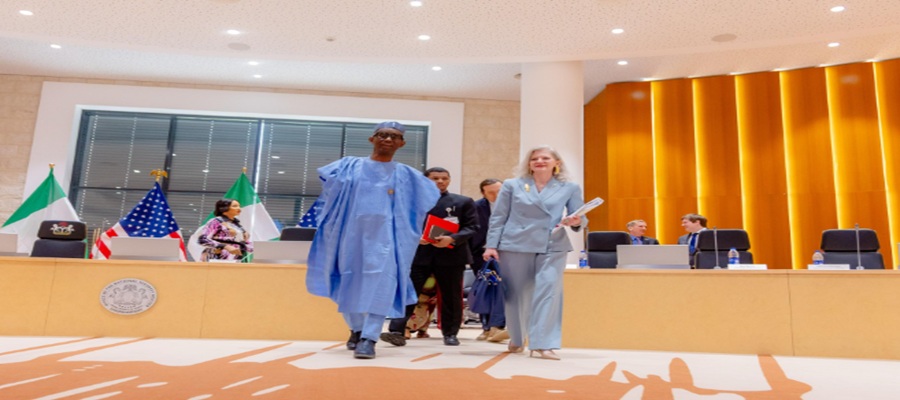General News
Holger Winklbauer Resumes as New IPC CEO

Holger Winklbauer has resumed work as the new chief executive officer of the International Postal Corporation (IPC).
Winklbauer was appointed CEO of IPC as of 1 August 2016, the Corporation announced via its website. A general manager with experience in logistics and the postal industry, strategy development, change management and consulting, Winklbauer aims to build upon IPC’s achievements to develop the company for the future.
Prior to joining IPC, Winklbauer was Head of Process and Financial Efficiency at DHL Global Forwarding, responsible for cross-country stabilisation of the New Forwarding Environment live countries.
In this position, which he held from September 2014 until June 2016, he focused on ensuring master and transaction data quality, reducing invoicing backlogs, increasing P&L accuracy and improving profitability across countries by improving processes and functionality.
Winklbauer has extensive experience within the Deutsche Post DHL Group, having served as CEO of DHL Global Forwarding Netherlands from 2010 until 2014 and as Executive Vice President First Choice from 2007 until 2010.
Prior to his functions at Deutsche Post DHL, Holger Winklbauer worked as Managing Director at DHL Consulting serving all divisions: PeP (Post, e-commerce & Parcel), Express, Global Forwarding, Freight and Supply Chain.
He also worked in logistics management at Metro MGL Logistik GmbH, Düsseldorf, in consulting at Research Institute for Operations Management (FIR), Aachen and in procurement at Mannesmann Anlagenbau AG, Düsseldorf. He studied electrical engineering and applied economics in RWTH Aachen University. He also followed the executive programmes at the Wharton School of the University of Pennsylvania.
Winklbauer was honoured with the International Quality & Productivity Centre Award in the category “Best Process Improvement Program” in 2010 and with the European Excellence Award in the category “Change Communication” in 2007.
Writing his first epistle to IPC members in the August e-newsletter, the new CEO said, “I am pleased to use this first edition of YourIPC after the summer break to address you in my new role. After many years in the logistics and postal industry, I am delighted to take the leadership of this truly international team, committed to support posts in embracing change in such a critical time.
“My ambition is to extend the already comprehensive list of IPC’s successes and to bring the company to the next level in order to better serve our members and customers’ needs in dealing with the challenges of an evolving global market. The speed and dynamics of the market have increased considerably, requiring a swift response from the postal sector.
Winklbauer said that e-Commerce will continue to experience a double-digit growth, representing major opportunities for posts.
“I am convinced that IPC can play an important role to allow posts to further boost parcel volumes, especially cross-border, through a greater interconnection of postal networks. It is my belief that one of the main obstacles preventing customers from buying online cross-border is the lack of trust. Posts are highly trusted brands on the domestic markets and by putting these trusts together, we can overcome this obstacle. Interconnect is a first step into that direction.
“The new IPC Data Hub, through which data is captured, stored and exchanged, is a major achievement that is allowing us to move from reporting to real-time data, in order to offer customers an end to end view. In the future, it will also enable us to move to forecasting. The Data Hub is quickly becoming the backbone of IPC solutions.
“My goal is to reinforce IPC as a think tank for the postal industry, through our market intelligence and consumer research, and to also offer a platform for our members to initiate synergies. Together, I am confident we will contribute to the successful transformation of the postal industry”.
—
General News
Nigeria Treats Religious Violence as Attack on State – NSA Ribadu

National Security Adviser Nuhu Ribadu has said the federal government considers religious violence an attack on the Nigerian state, stressing that the protection of all citizens, regardless of faith, is non-negotiable.

According to presidential spokesperson Bayo Onanuga, Ribadu made the remarks in Abuja at the close of a US–Nigeria Joint Working Group session.
“Nigeria is a deeply plural society, and the protection of all citizens, Christians, Muslims, and those of other beliefs, is non-negotiable,” Ribadu said.
“Violence framed along religious lines is treated as an attack on the Nigerian state itself.”
In a follow-up post on X, Ribadu said the joint working group has recorded “tangible operational gains” in the fight against terrorism.
The working group was set up following Nigeria’s designation as a Country of Particular Concern (CPC) by US President Donald Trump, a label that often triggers policy actions aimed at ending severe violations of religious freedom.
At the meeting, Ribadu led Nigeria’s delegation, which included representatives from 10 ministries and agencies, while the US delegation, made up of eight federal agencies, was led by Allison Hooker, US under-secretary of state.
Ribadu said Nigeria-US security cooperation has moved from dialogue to action, resulting in the disruption of terrorist networks and transnational criminal groups. He also praised the US for supplying drones, helicopters, platforms, spare parts, and other support systems over the past five years.
Speaking at the session, Hooker said the US was committed to expanding its partnership with Nigeria, particularly on deterring violence against Christian communities.
“Today, we are here to discuss how we can work together to deter violence against Christian communities, prioritising counter-terrorism, insecurity, investigation of attacks, and holding perpetrators accountable,” she said.
She added that efforts would focus on reducing killings, forced displacement, and abductions of Christians, especially in Nigeria’s north-central states
General News
PalmPay User Shares Experience on Fintech Apps to Trust in Nigeria

For many Nigerians, fintech apps are judged by one simple question: Can I trust the platform? For Happiness, a young Nigerian entrepreneur, the answer manifested in the most defining moments of her life.

Trust Built Through Everyday Use
In 2025, Happiness relied on PalmPay to run her business, from receiving customer payments, paying vendors, and managing daily transactions. During PalmPay’s Hustle Grant Campaign, she joined thousands of small business owners hoping to win the N500,000 funding.
While she didn’t make the shortlist, the campaign gave her business something just as valuable: visibility. New customers discovered her brand, enquiries increased, and sales followed.
PalmPay didn’t just host a campaign; it created an ecosystem where small businesses could be seen and supported.
Just days later, Happiness’ life changed. On August 30, 2025, she lost her father. With this loss came challenges, especially payments. They tried transferring money through regular banks but were met with declined transactions. Happiness suggested using her PalmPay account and it was successful.
In a moment defined by loss and urgency, PalmPay cut through the chaos, proving that reliability isn’t a feature, it’s a lifeline. Happiness’ relationship with PalmPay didn’t stop at transactions. Through other management tools on the app, she learned to build discipline around her finances.
More Than an App, a Financial Partner
Beyond transactions, PalmPay’s tools helped Happiness build better money habits and financial discipline. Today, the brand continues to reward reliability through initiatives like its ongoing Premier Cool campaign, reinforcing a simple message: consistency should come with value.
The idea is simple: Purchase a bar of soap and stand a chance to get ₦10,000cash and other cash benefits.
It’s PalmPay’s way of saying that smart money habits deserve real value in return.
Why PalmPay Earns Trust
Life doesn’t give warnings before it tests you. When it does, you need a platform that doesn’t just usually work but always works.
For many users, PalmPay proves to be more than a payment app. It is a trusted partner powering ambitions, supporting users through defining life moments, while helping them bank smartly.
When it mattered most, PalmPay worked. To watch the full testimonial visit: @palmpayapp_ng
General News
Nigerians Target Self-Improvement, Business Startups in 2026 Google Data

Google Search data from the first two weeks of 2026 reveals Nigerians are prioritising ambition, self-growth, and entrepreneurial ventures as they embrace the new year with renewed drive for personal and professional excellence.

The data shows a 40 per cent spike in searches related to self-improvement and “becoming better”, reflecting a nationwide shift from mere resolutions to actionable plans across boardrooms, classrooms, and homes. Entrepreneurship leads the charge, with “how to start a business” topping “how to start” queries after an 80 per cent surge, alongside rising interest in blogging, podcasting, and YouTube channels to foster economic opportunities.
Personal development dominates, as searches for “how to be a better person” rose 20 per cent, extending to relationships with queries on becoming better lovers, partners, husbands, wives, and listeners. Health resolutions gain traction, with 40 per cent increases in “how to eat healthy”, “healthy diet”, and “how to meditate” underscoring commitments to physical vitality and mental wellness.
Skill mastery captivates diverse audiences, from “how to improve English” and communication skills to enhancing memory, credit scores, and even handwriting, while leisure pursuits spike in “how to get better at” chess, singing, running, Fortnite, and soccer. Top searches include “how to improve communication skills”, “how to be a better listener”, and entrepreneurial starters like “how to start a podcast”, painting a portrait of a nation honing edges for success.
Taiwo Kola-Ogunlade, Communications and Public Affairs Manager for West Africa at Google, described the trends as a “powerful reflection of Nigeria’s collective ambition”, affirming the company’s dedication to tools like Search and Gemini for guiding Nigerians toward prosperity

 E-Financial3 days ago
E-Financial3 days agoZenith Bank Gets Regulatory Approval for Full Takeover of Paramount Bank

 Telecom3 days ago
Telecom3 days agoNew Investment Fund Targets Acceleration of Emerging Technology in Nigeria

 E-Business3 days ago
E-Business3 days agoFirm Detected a Fivefold Surge in QR Code Phishing Attacks in the Second Half of 2025

 News3 days ago
News3 days agoNITDA Commits to Digital Inclusion for Persons with Disabilities

 General News2 days ago
General News2 days agoPalmPay User Shares Experience on Fintech Apps to Trust in Nigeria

 News2 days ago
News2 days agoStakeholders Demand Stronger Governance and Infrastructure to Drive Tech Adoption @ Lagos AI Summit

 General News2 days ago
General News2 days agoNigerians Target Self-Improvement, Business Startups in 2026 Google Data

 General News2 days ago
General News2 days agoHow Inside Jobs and Policy Shocks Trigger Nigeria’s Rising Loan Crisis













